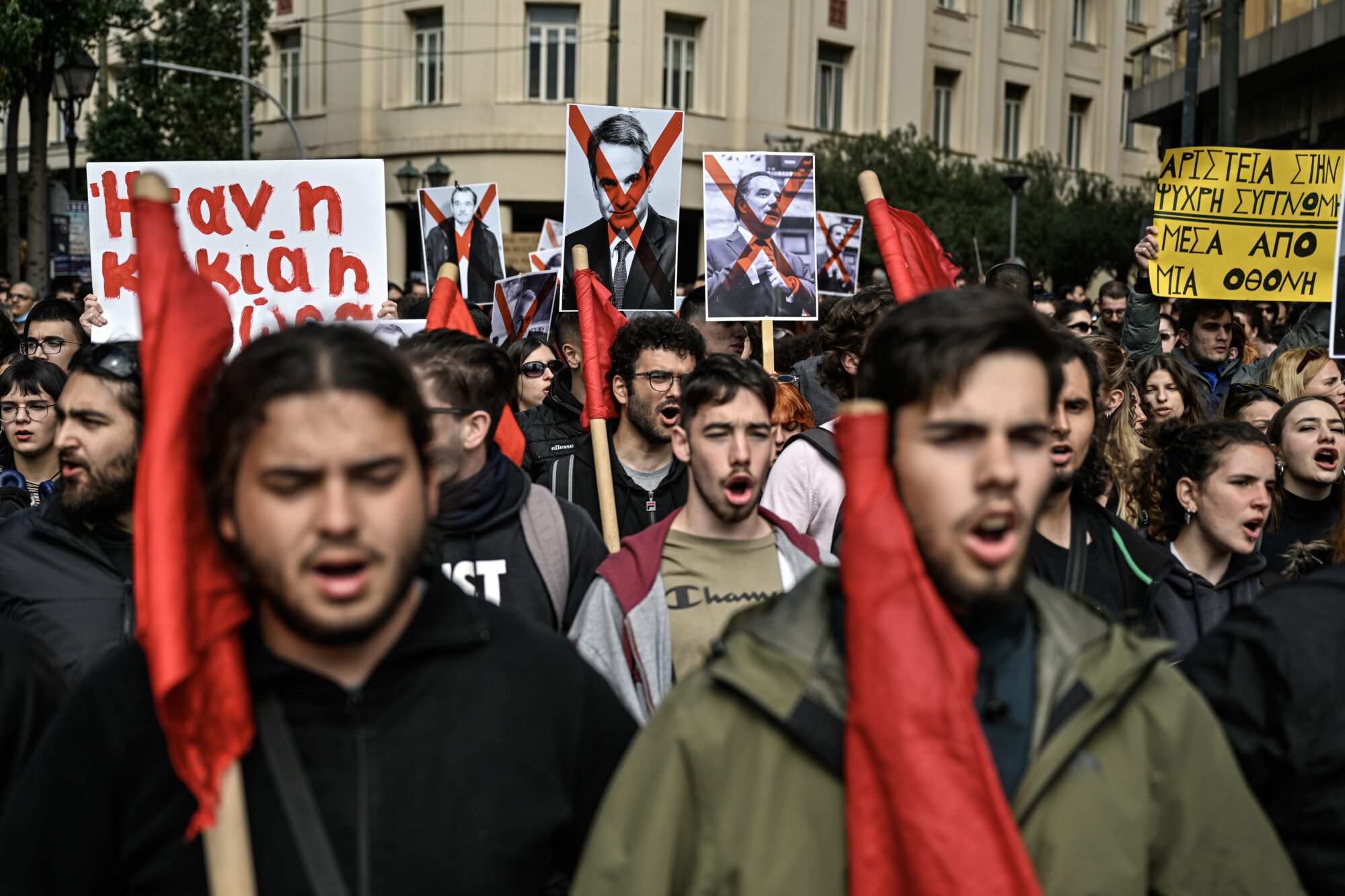
Greek protesters take part in a demonstration in Athens
Louisa Gouliamaki / AFP
Public life in Greece came to a virtual standstill Thursday, March 16th. Nationwide strikes, organized by Greece’s largest unions, were held in protest over last month’s train accident, the country’s deadliest ever.
As reported by Associated Press, ferries remained docked, public hospitals were forced to make do with emergency staff, public transport services came to a halt, and classes at state-run schools were canceled.
Such strikes coincided with demonstrations, which took place in Athens—where, according to police estimates, 25,000 people rallied—Thessaloniki, and other cities.
NOW
— PAME Greece International (@PAME_Greece) March 16, 2023
📌 ATHENS
New huge general strike#greecetraincrash #Απεργια16Μαρτη #Απεργια #απεργια_Τεμπη #Greece #Greecetrain #hellenic_train #GreeceTrainAccident pic.twitter.com/lJeb1GgH7b
General #strike in #Greece. Thousands protest the #GreeceTrainCrash. pic.twitter.com/TC4hGTA2K5
— Savvas Karmaniolas (@savvaskarma) March 16, 2023
While largely peaceful in most cities, the Athens demonstration was marked by unrest, as some protesters hurled molotov cocktails at a police cordon near the parliament building.
#Greece: #Athens has also been hot all day: pic.twitter.com/Nn86bhy5EM
— The WannabeWonk (@PotempkinBrain) March 16, 2023
In response, riot police deployed tear gas and sound grenades.
NOW
— PAME Greece International (@PAME_Greece) March 16, 2023
📌 ATHENS
New huge general strike#greecetraincrash #Απεργια16Μαρτη #Απεργια #απεργια_Τεμπη #Greece #Greecetrain #hellenic_train #GreeceTrainAccident pic.twitter.com/lJeb1GgH7b
Unknown assailants vandalized the car of representative Olga Gerovasili of the Greek center-left SYRIZA party, as reported by Ekathimerini. Sledgehammers broke the vehicle’s windows while the former minister was marching with the demonstrators. Reportedly, her police escort was hit in the face and had to be transported to the Parliament’s clinic for treatment.
The strike is the latest in a series of anti-government protests that have taken place since February 28th’s deadly collision between a passenger train and a freight train near the town of Larissa in the central Greek region of Tempi. The crash left 57 people dead and dozens injured.
Protesters accuse their government of having ignored repeated warnings about inadequate safety measures. “It was not human error, it was crime,” read one banner carried by protesters outside the parliament building. “Our deaths, your profits,” read another.
The Greek government has acknowledged that its railroad sector has suffered from years of neglect and lack of investment—a legacy of the 2007-2008 debt crisis, which forced Greece into a stringent austerity program.
A 59-year-old station master, accused of having turned a wrong switch, which caused the trains to run on the same track, had been arrested for negligent homicide. If convicted, he could face 10 years in prison. Three more railroad workers were also arrested.
These steps have, however, done little in assuaging the public’s anger, while conveniently providing the opposition with ammunition.
Popi Tsapanidou, a spokeswoman for the main leftist opposition party SYRIZA, told Skai television that Prime Minister Mitsotakis’ conservative government had had “four years to fix problems with the rail network, but instead of owning up to that responsibility, they are blaming everyone else.”
Many Greeks seem to agree. They believe the accident could have been prevented if authorities had taken proper precautions. Later revelations about staff shortages and a faulty signaling system only served to show how dire a state Greece’s rail network actually is in.
New Minister of Transport George Gerapetritis said on Tuesday, March 14th, more staff would be hired. In areas where signaling systems are not operational, trains would also be required to reduce speed.
In an earlier meeting with Gerapetritis and officials from Greece’s railway infrastructure operator OSE and Hellenic Train (taken over in 2017 by FS, the Italian state’s railroad company), Mitsotakis said that “we must win this war,” adding that he was determined to eliminate the factors that led to the crash.
Earlier, Mitsotakis had requested EU support to aid him in implementing urgent safety upgrades to the rail network.
Hellenic Train said on Wednesday, March 15th, families of the dead and injured would receive between €5,000 and €42,000 each to cover their “immediate needs.”
Despite his efforts, the train accident might prove more damaging for Mitsotakis than the wiretapping scandal which threatened to sink his government—a fate it narrowly escaped following a no-confidence vote in late January.
Before the accident, Mitsotakis was expected to announce elections on April 9th. Following last month’s tragedy, Mitsotakis’s government decided that elections would be held no sooner than April 16th, so it could turn its attention to the tragedy’s fallout, and implement security precautions.
Recent polls, conducted after the accident, paint a troubling picture for Mitsotakis and his ruling right-wing New Democracy party (EPP). Public support has dwindled, as the EPP’s former 6-7% lead over SYRIZA, its main rival, has dipped below 3%.
The elections will be held under a new law, which practically guarantees a coalition government. In the first round, the elections will be held with a proportional system, while one month later, in the second, a coalition of parties will need approximately 37-38% of the vote to be able to form a government.
